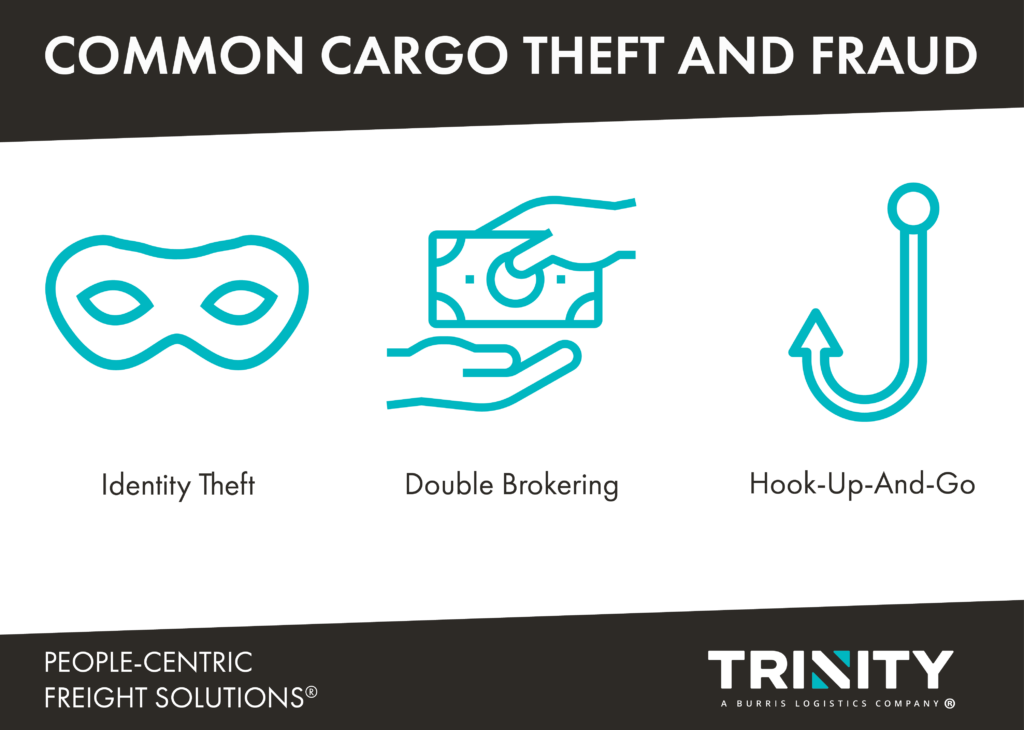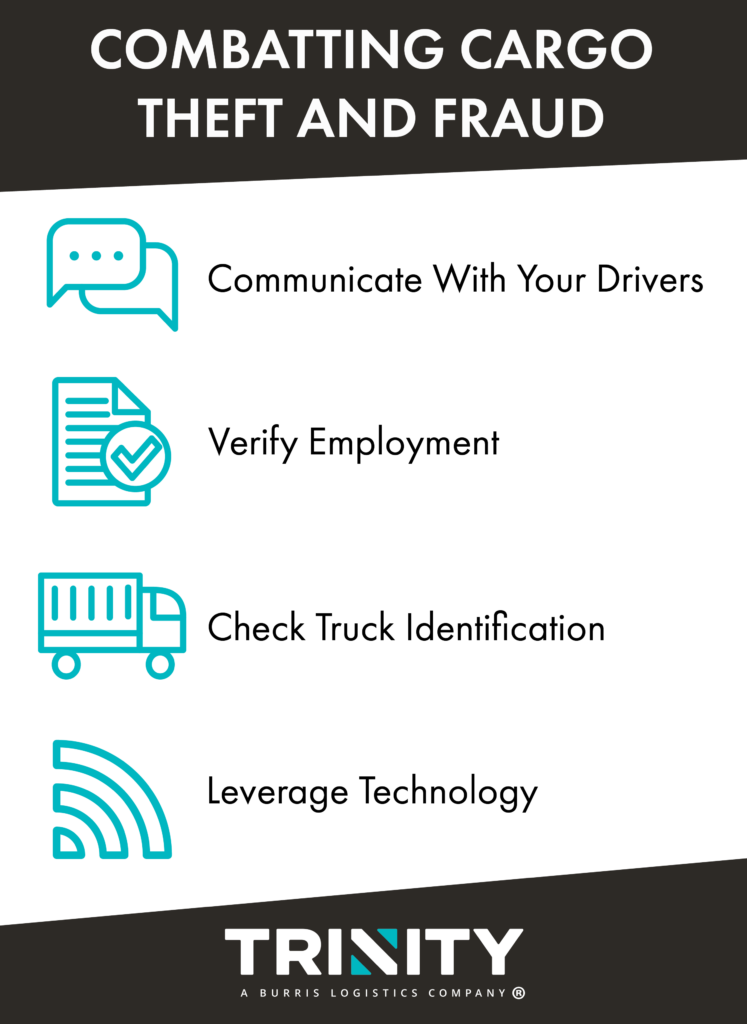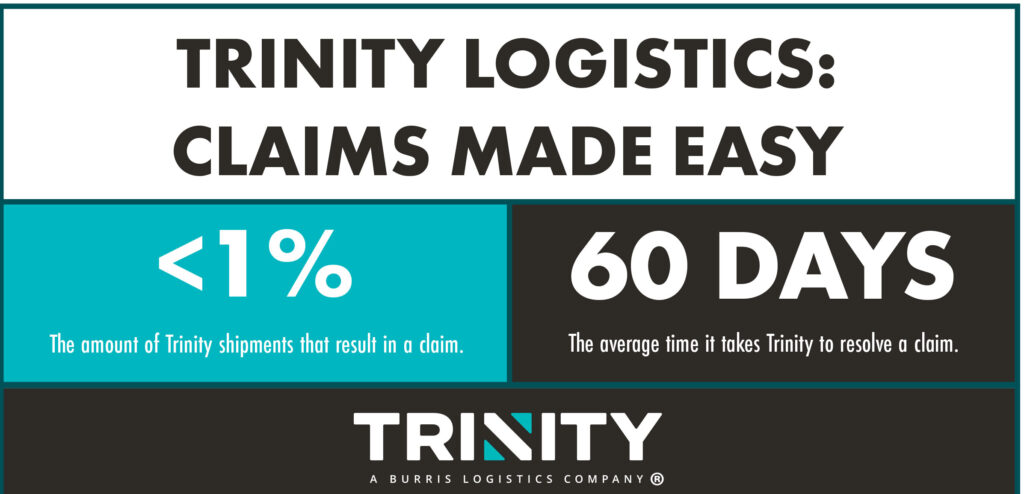Cargo theft and fraud is a common topic in many circles these days. No matter where we look, we see it mentioned in news headlines and see its impacts on price increases on the store shelves. In fact, CargoNet recently shared data showcasing that cargo theft has reached a 10-year high, increasing 59 percent year-over-year (YoY) in the U.S. alone.
While cargo theft and fraud have always been a risk in the world of logistics, the kind of theft and fraud we see today is evolving from what we used to know. Years ago, common cargo fraud involved extortion attempts via loads held hostage as well as t-check scams, where bad actors would book shipments and ask for a fuel advance, take the money, and disappear, often without completing delivery or even picking up the shipment they received the payment advance for.
While these kinds of fraud still occur, they are not as prevalent as they once were. Today’s cargo theft and fraud involve new strategies, and it’s important that companies stay aware of emerging tactics and remain vigilant to protect themselves from unnecessary and tragic losses.
The Evolution of Cargo Theft and Fraud
In the past, cargo theft was commonly known as the act of stealing from a truck or even unlawfully taking cargo from a storage facility. Usually this might occur when the truck driver was asleep or when the parked truck was left unattended in an unsecured lot. Now, cargo theft claims for lost product can be especially difficult to navigate as many insurance carriers have specific language and exclusions written within the pages of cargo policies limiting circumstances under which they will cover cargo payment for cargo theft incidents.
For example, some policies may dictate that the truck must travel within a specific radius only and cannot be left unattended unless in a secured lot. Unfortunately, the definition of “secured lot” is wide-ranging and debatable. Does “secured lot” mean there’s a locked fence, good lighting, cameras, surveillance, or a physical security employee on patrol? There’s simply a lot of confusion and unknowns when it comes to cargo theft in general.
The Federal Trade Commission (FTC) recently reported that the top scam type for 2023 involved imposters. We in logistics and other sectors have been experiencing this concept. Scenarios expand beyond just plain and simple identity theft, at least in the logistics industry. The current phase of cargo theft involving identity misappropriation is very strategic. In fact, CargoNet also shared data that strategic theft has increased 430 percent year-over-year (YoY). As quoted by Scott Cornell of Travelers Insurance, “Strategic theft is when they use various means to trick you into giving them the freight and that’s through methods like identity theft, fictitious pickups, double brokering scams, those methods are where we’re seeing the biggest increase over the last 18 months.”
This strategic cargo theft makes incidents that were already puzzling that much more difficult to solve. This kind of cargo theft often spans over multiple state lines (interstate) as opposed to intrastate. When this occurs, jurisdiction is not given to local or state authorities but may extend to federal jurisdiction. However, to establish a case seeking federal help, not only would more than one state need to be involved, but the cargo value must warrant federal attention to exceed $100,000 and perhaps even $500,000 or more, depending on the states involved. You may have police consider strategic cargo theft a civil matter that will not be taken under investigation.
Further, with these scenarios, there is confusion concerning who takes or issues the theft report Should that be the shipper, the receiver, or the freight broker? Is the report filed with law enforcement jurisdiction at the origin where freight was often last seen, or should reports be filed at the delivery jurisdiction, where the cargo never arrived? The cargo owner may attempt to file a police report where the transfer of goods occurred, which is the location where the driver took possession of the cargo for transport.
The State of Strategic Cargo Scams
Certain states like California and Texas have become hotspots for these strategic cargo scams, often involving imposter identities. Many of these fraudsters operate outside the U.S., finding and exploiting weaknesses in the system so products may end up outside the country. This further hurts the U.S. economy when items are produced here and those companies don’t get a financial return, thus losing money that should be going back into the economy. There are other additional costs affecting manufacturers to consider, such as lost time, materials, and labor to duplicate the goods that were originally stolen.
The Federal Motor Carrier Safety Administration (FMCSA) system, originally designed to verify motor carrier legitimacy, has become a target. Phishing scams and other methods have targeted carriers with a motive to change a carrier’s contact information and use their MC authority for nefarious purposes. Bad actors have been caught posing as valid, reputable carrier companies. They often go as far as creating web domains similar to those of established carriers or caught purchasing MC numbers from those going out of business or wishing to exit, especially with the recent market slowdown, with the new buyer updating that company’s contact information. They look and “run” as the previous motor carrier, using that previous authority and reputation to run their scams. This facade allows them to gain possession of or intercept the cargo and divert it to a pre-arranged location for a quick disappearance. The FMCSA is aware of these trending cargo theft scams and is actively looking to improve their vetting and even get rid of MC numbers for carriers.
There’s also a prevalence in double brokering. This is when an unauthorized carrier accepts a shipment or assigns it to another carrier lacking the proper authority to broker it in the first place. It can also involve the re-brokering of shipments without authorization to legitimate entities with broker authority. This creates a chain of uncertainty and lack of control over carrier selection while increasing the likelihood of unpaid delivering carriers, and double payments required from freight brokers and shippers, paying more than agreed for delivery services.
Load boards, while usually valuable tools for shippers and freight brokers to connect with available carriers, are also now breeding grounds for fraud. Fake postings and compromised information have created a haven for scam artists. The more information presented on a load posting, such as commodity, value, or even location, the more opportunity for these scammers to successfully replicate fake loads and even steal rate confirmations from legitimate actors. Detailed information provided on load boards make loads easier targets for those with motive to engage in strategic theft and double brokering.
Cargo fraud involving identity theft is not limited to carrier companies. Scammers also pose as shipper companies. These shipping requests will often come in as inbound leads rather than relationship leads. Scammers create fake web domains and use reputable companies to gain credit access, then use that access to pose as both a shipper and carrier. They’ll orchestrate this fake shipment of theirs, make it look as if it has been delivered with forged paperwork, and collect payment before being found out.
A lot of these shipments involving strategic cargo theft end up being diverted to alternate warehouses. In these cases, it is common for the carrier booked to be legitimate but for a bad actor to somehow get in the middle and divert the driver to deliver to a different location altogether, promising an increase in money. Once the freight arrives at the alternate location, there’s a truck en route or waiting to whisk away the freight quickly. Diverted items do not stay in one place for long, making it difficult to track and recover the cargo.
How to Be Proactive and Prevent Cargo Theft and Fraud
Trust, But Verify
Whether dealing with a shipper company or carrier, thorough verification is needed.
For shippers requests, use sources like ZoomInfo, LinkedIn, and Google. Research the company along with the contact who reached out. Remember that most shipper scams involve inbound leads as opposed to solicited new business or existing relationships. Before agreeing to arrange or transport the movement of goods, use Google Maps to ensure the requested pickup and delivery locations are legitimate.
For example, if the shipping company is a well-known business but Google Maps Street View shows you a location that doesn’t look like one of theirs, something might be off. Another red flag could be if the commodity to be shipped doesn’t line up with their standard business, such as an electronics company trying to ship lumber or rice.
For carrier requests, first vet that they have authority to operate with the FMCSA. View their safety rating and be cognizant of shipper or load-specific requirements, such as drivers who have TWIC cards, and commodity specifics, like cargo type and value. Confirm the carrier has adequate insurance coverage for the shipment they are booking, such as reefer breakdown coverage, if they are to haul a temperature-controlled shipment. Cross-check any other shipment requirements, such as interstate authority or hazmat certifications.
Review relationship and load history if they have a shipment history with you and ensure the new request lines up with previous hauls. Be aware of MC misappropriating. Check if the FMCSA information or profile has recently been updated. Some things to look out for are contact, address, or email address changes. Double-check that the carrier company is not associated with any known bad actors and adhere to your company’s own internal vetting standards.
There are various informational and vetting applications like Highway and Truckstop to further qualify carriers. Ensure the equipment the carrier owns lines up with the equipment required for the shipment. For example, it wouldn’t make sense if a carrier books a temperature-controlled shipment when the carrier owns no refrigerated trailers.
Use Relationships, Limit Load Boards
While load boards offer convenience, strong relationships with carriers provide a significant advantage. Building trust and gaining a deeper understanding of their business reduces your risk of cargo theft and fraud.
When load boards are needed, be strategic with your postings and focus on the security of the information you share. Scam artists often use load boards as a resource for information to replicate or find their next victim. They often look at the locations, the kind of cargo, and more. Avoid posting detailed descriptions of your cargo. Keep the information you share as simple and minimal as possible. Protect that information until the carrier has been both vetted and confirmed.
Trust Your Gut
If something feels wrong at any time, report it to your Risk Team or dedicated personnel right away. With cargo theft, time is of the essence. The first 48 hours are critical as stolen freight typically doesn’t stay in the same place very long. Your best chance of recovering it is within those early hours of noticing it.
Your first line of defense to prevent cargo theft and fraud incidents is your pickup location. Those workers have the eyes and, hopefully, surveillance to see if the truck coming in is the right one. They can check that the MC on the truck is correct, that the driver has the right equipment for that shipment’s requirements, that the driver is the one booked, and that they know the correct location they need to deliver to.
Shippers can also be proactive and place trackers in with their freight, which can be beneficial for trip progress tracking as well if the load gets stolen. While many carriers do have trackers these days, it’s best not to rely solely on them. Scam artists have been known to disable trackers or ping them to another cell phone, making the shipment look like it’s traveling where it is supposed to go, while it is, in fact, stopped or delivering to an alternate location.
Shippers can also ensure they use strong seals that are tamper-proof. Ensure your dock workers are informed and proactive in reducing potential incidents. Shippers may also consider investing in extra shipper’s interest for its product, for a first-party insurance policy which provides a layer of extra protection. Develop strong relationships with the freight brokers you work with. Know who the emergency personnel are on the shipper and broker side and be armed with their contact information so you know exactly who to contact at all times of the day should a theft or another emergency occur during shipping.
Knowledge is Power
Stay in the know of what’s going on and trending in cargo theft and fraud by networking with known associations, like CargoNet and the Transport Asset Protection Association (TAPA), as well as the additional connection of the Transportation Intermediaries Association (TIA) for freight brokers. These organizations constantly educate on evolving threats to keep members aware.
Ensure you have an emergency plan in place and educate your team so you can be well prepared for an incident. Develop relationships with law enforcement and investigation agencies who can help you put the word out about your loss and assist in finding your freight or the scam artists involved.
Combatting Cargo Theft is a Shared Responsibility
Combatting cargo theft and fraud requires collaboration from all within the logistics industry. Shippers, brokers, carriers, legislators and law enforcement must work together to create a more transparent environment with strict accountability to make it more difficult for thieves and fraudsters to operate.
Cargo fraud is growing, and tactics are ever-changing. Even with all the right measures in place, fraud may not be 100 percent preventable. That said, though we can’t stop it all, we can implement not only prevention measures but response strategies. By staying vigilant and educated, we can collectively demonstrate to these bad actors that it’s not worth the effort anymore. It is up to us to create a future where the movement of goods is more efficient and secure than it is today.
Get More Content Like This In Your InboxAbout the Author

Kristin Deno currently holds the role of Director of Operational Risk at Trinity Logistics. Deno holds a Certified Cargo Claims Professional certification through the Certified Claims Professional Accreditation Council (CCPAC), with almost 15 years of experience and knowledge in claims, insurance, compliance, and risk. She has a passion for knowledge and servant leadership, always looking to grow professionally and share her expertise to those interested. She’s well known at Trinity for assisting fellow Team Members, Shippers, and Carriers with complex claims and doing all she can to mitigate any potentially concerning scenarios. Deno consistently looks for opportunities to share her knowledge and insight outside of Trinity, having recently attended the TIA’s 2023 Policy Forum in Washington, D.C., Traveler’s and CargoNet’s Cargo Theft and Transportation in Q4 2023, and the TAPA T1 National Cargo Theft Summit in May 2024.
In recent years, the transportation industry has seen a concerning rise in cargo theft and fraud, and the culprits behind it are becoming increasingly sophisticated with their tactics. According to Land Line, cargo theft increased by 49 percent in the first quarter of 2020, with an average cargo loss value exceeding $105,000 per incident. In a recent report in July 2023 by CargoNet, it was found that supply chain risk events increased 57 percent year-over-year (YoY), accounting for 44 million in stolen shipments in quarter two of the calendar year.
With such alarming statistics, it’s essential to be proactive against cargo theft and freight fraud. So that you can be fully prepared, here are some of the most common methods used by criminals in cargo theft and fraud, along with proven strategies to prevent these issues from happening in the first place.
Common Cargo Theft and Fraud Scenarios
Dealing with cargo theft or fraud when shipping freight is far from ideal. It’s even more frustrating when you realize there are many ways for individuals to commit those crimes.
1. Identity Theft
Identity theft is currently one of the top methods scammers use to carry out fraudulent activities in the transportation industry. Scammers will impersonate legitimate trucking companies by using their stolen identities. Once they’ve acquired a stolen identity, scammers have several ways in which they use it. Some will pose as the trucking companies, show up to pick up the freight, and then disappear with the cargo. Others will request fuel advances, take the money, and vanish. Then you have others that will take it a step further and double broker.
2. Double Brokering
Double brokering is the unethical practice when a shipper or broker books a carrier for a shipment, and the carrier then brokers or tenders the shipment to a third party without the shipper’s or broker’s knowledge or approval. Double brokering not only raises liability concerns, such as a potential lack of insurance or approved contract with the actual carrier handling your freight, but it also results in a loss of control. If double brokering occurs, it can lead to billing and liability issues for you as the shipper or the freight broker.
3. Hook-Up-And-Go
This method of theft is precisely what it sounds like. Thieves connect tractors to trailers and simply drive away with them. These incidents typically occur at truck stops or drop yards when drivers are distracted. Although this method is less common today thanks to advanced technology and tracking systems in trailers, it’s still crucial to remain vigilant.

Combatting Cargo Theft and Fraud
When it comes to combating cargo theft and fraud, it can be challenging to know where to start. While securing trustworthy carriers is a solid initial step, several proven methods can help prevent fraud.
1. Communicate with the Drivers
Truck drivers are your first line of defense against cargo theft. Whenever possible, ensure that the drivers you work with have undergone proper screening to minimize the risk of fraud. It’s also important to keep your driver relationships informed about any cargo theft activities so they can stay vigilant against potential threats. Keep them aware of any hijacking hotspots and encourage them to report any suspicious incidents promptly. Additionally, if you employ drivers, ensure that they have received adequate training.
2. Verify Employment
Before finalizing any arrangements, always verify that the person you’re talking to is authorized from the logistics company they claim to work for. Use the Federal Motor Carrier Safety Administration (FMCSA) website to obtain the company’s contact information and speak to them directly to confirm their identity. If the company has no knowledge of the individual, it’s a red flag, and you’ve successfully avoided a potential scam.
3. Check Truck Identification
Legally, every motor carrier must display their company name and USDOT or MC number on the side of their truck, found on the door of the cab. If the name on the side of the truck doesn’t match the name of the company you’ve hired or that your freight broker has arranged on your behalf, it should raise immediate concerns with your dock workers. We strongly recommend implementing a procedure that requires your loaders to inspect the door and confirm a match. If there’s any discrepancy, the truck shouldn’t be loaded until the issue is resolved.
4. Leverage Technology
Technology can be a powerful ally when it comes to combatting cargo theft and fraud. GPS tracking can help locate a stolen vehicle, while geofencing applications can notify you if your freight deviates from its intended route. Making use of these kinds of technology can significantly reduce the risk of any cargo theft.

“Recently, Trinity Logistics had the opportunity to attend TIA’s Policy Forum in Washington, D.C. where we met with some of our elected state officials and staff,” said Kristin Deno, Director of Operational Risk. “We discussed the spike in fraud and impacts of cargo theft to the economy, which is estimated to have a cost of 800 million per year. Ultimately, these unsightly costs trickle down to the consumer, increasing the cost of goods for all. Because many double brokered or stolen loads begin with fake identity, verifying that you are communicating with the entity you think you are, is crucial. Newly created web domains and email addresses are being used to impersonate established carriers and even shipper businesses.”

Trust Trinity Logistics to Safeguard Your Shipments
Taking a proactive stance in fighting cargo theft and freight fraud is essential to ensure the safety of your shipments.
However, handling this task on your own can be burdensome. By partnering with a reliable 3PL like Trinity Logistics, you can save valuable time that would otherwise be spent on vetting carriers.
At Trinity, we meticulously verify all carrier relationships that we work with, not just during the initial setup, but for every shipment. Additionally, our strong relationships built with trusted carriers can further strengthen your confidence that your freight will arrive safe. Our Carrier Compliance and Carrier Development Teams are testaments to our focus on carrier verification and relationship building. We also offer cutting-edge tracking technology upon request, so you’ll know exactly where your freight is located at every step of the way.
Further, we take cases of cargo theft or fraud seriously. Situations where carriers are caught engaging in double brokering or identity theft are researched and offenders may be immediately placed on our Do-Not-Load (DNL) list.
Now, we understand that no matter what you do, things still sometimes happen. Even so, we’re proud to share that less than one percent of all shipments coordinated with Trinity Logistics end up in a claim. When that does happen, we’re just as prepared to tackle it. We have a Cargo Claims Department at the ready to assist you in navigating issues that may arise from your shipment with an average rate of 60 days in resolving cargo claims.

If the possibility of cargo theft and freight fraud is keeping you up at night, then consider working with Trinity Logistics so you can gain peace of mind over your freight shipments.
I want to know more about Trinity’s logistics services.Shipping scams have increased exponentially in the past few years. Is your Freight Agent business taking all the steps needed to prevent them?
As a Freight Agent, your days are busy servicing your customer and carrier relationships and managing shipments. The last thing you need on your plate is a scam artist wreaking havoc and getting your business (or one of your relationships) into trouble.
Common Types of Shipping Scams
Double-Brokering
Double-brokering is a sticky mess that Freight Agents should aim to avoid. The double-brokering of shipments has been in the industry for many years. As a refresher, double-brokering is when a carrier accepts a shipment under the pretense that it will be moving on their assets, and then gives that shipment to another carrier to move the freight. Often what happens is the carrier that double-brokered the shipment gets paid, either by the broker or the shipper, but has no intention of paying the carrier that physically provided the transportation service.
Carrier Identity Theft
More recently, we have seen carrier identity theft become more commonplace. This is when a scam artist assumes the identity of a reputable motor carrier with the intent of stealing the freight or getting advances of cash but with no desire to deliver the freight to its intended destination.
Best Practices for Preventing Shipping Scams
Preventing shipping scams from interrupting your Freight Agent business starts with your initial conversations with a carrier. One must be cautious and use a little bit of super sleuthing when negotiating rates and booking available shipments.
Here are some best-demonstrated practices to help you sniff out a potential shipping scam:
Check the DOT AND MC Number
Carriers with the intent to do things fraudulently will attempt to purchase an MC number that is less than seven digits long. Currently, most new carriers registering are seeing MC numbers that start with 14 or 15 and are seven digits in length.

By checking the age of the DOT number and MC number, you could see a possible red flag if the DOT number is relatively new, but the MC number is one that was originally issued several years ago.
Is the Person Booking the Load Using the Mute Button Frequently?
This is a possible red flag to be aware of. Often, this happens with shipping scam artists because they have other people in the “office” attempting to “sell” the shipment to another carrier and they don’t want you to overhear.
Immediately Accepts the Rate
Negotiating a rate with a carrier is pretty much expected. If a carrier just blindly accepts the rate as is, that could be a possible red flag. Shipping scam artists don’t care what the rate is because they are intending to re-sell it to another carrier.
Always Check the Registered Phone Number
Does the phone number match what is listed through Federal Motor Carrier Safety Administration (FMCSA)? You can quickly check a carrier’s profile via SAFER Company Snapshot. If it doesn’t match, that’s a possible red flag. Call the FMCSA registered phone number and verify the number you were talking to works for them before you finalize any details with the shipment.
Carrier’s Communication is Odd
Does the carrier try to rush you off the phone when booking the load? Is their communication only done via email? Do they provide you with the phone number of the actual driver or try to avoid giving that information? These all can be red flags.
Shipment Updates are Not Consistent
Do the updates they give not match what you’re hearing from the shipper? If they claim the truck is on-site, but the shipper states otherwise, another possible red flag that this could be the work of a scam artist.
Can You Get Ahold of the Driver?
Speaking of the driver, does the driver actually answer their phone? Does the driver agree to tracking via many of the tracking apps that are commonplace in the industry now?
Don’t Let Your Freight Agent Business Fall for Any Shipping Scams
Taking the extra few minutes to fully vet the carrier you look to entrust your customer’s shipment with will help you avoid a potential situation that could cost you and your company thousands if not tens of thousands of dollars. If your gut says something seems a little bit shady, or too good to be true, it usually is right, and best to move on to the next carrier you’re considering.
You Can Trust Trinity’s Carrier Relationships
Here at Trinity, we work hard to proactively avoid shipping scams affecting our business, which includes your Freight Agent business, too. We make sure to consistently verify who we are working with and build strong, solid relationships, as well as offer state-of-the-art tracking technology, so you know where your customer’s freight is every step of the way.
With our People-Centric Team and technology at the ready to support your business, you can spend less time on back-end tasks like initial carrier vetting, and more time focused on growing your customer and carrier relationships, and ultimately, your revenue.
To learn more about the world-class support you can receive from Trinity Logistics, call 800-846-3400 ext. 1908 or click the button below.
CHECK OUT THE BENEFITS OF OUR FREIGHT AGENT NETWORK